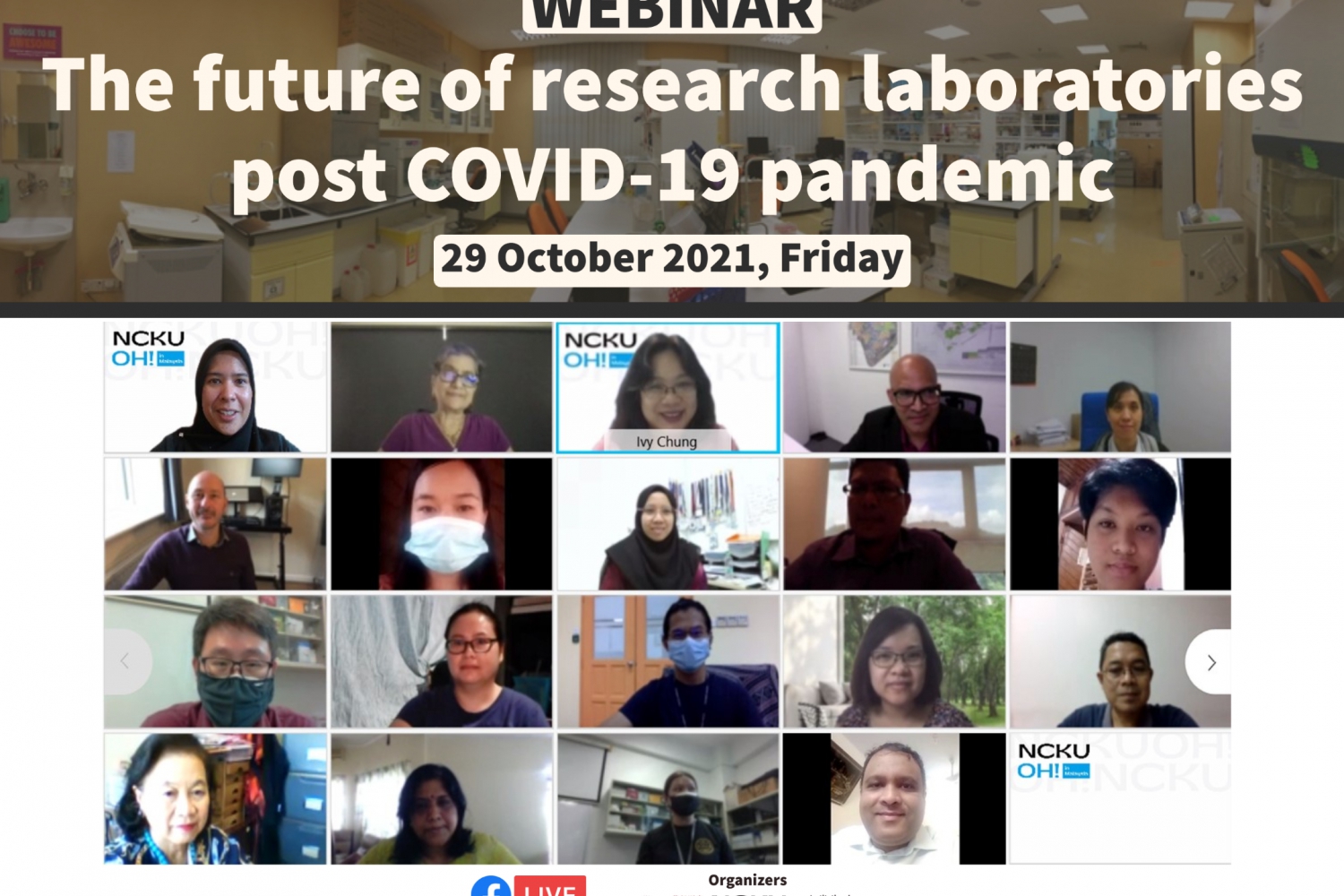Malaysia Business
[Webinar Series] The Future of Research Laboratories post COVID-19 Pandemic
2021-10-29

The National Cheng Kung University (NCKU) Overseas Hub in Malaysia in collaboration with Institutional Biosafety and Biosecurity Committee (IBBC), Universiti Malaya have organized a webinar entitled “The future of research laboratories post COVID-19 pandemic” on October 29th, 2021 starting at 3.30 – 5.00pm (Malaysia & Taiwan time). The webinar was broadcasted live via Cisco Webex platform and Facebook Live (@NCKUOHinMalaysia). The 90-minutes webinar attracted 65 participants globally. Among the participating universities were Universiti Malaya and UCSI University (Malaysia), De La Salle University and Holy Cross College of Calinan (Philippines), Airlangga University (Indonesia), Dow University of Health Sciences (Pakistan), and Mahidol University (Thailand). The live webinar session was recorded and available at https://fb.watch/8Yt4aawrIo/.
Due to the COVID-19 pandemic, most of the scientific research laboratories across the world has been making changes in their laboratory operations and biosafety measures to protect the health and safety of their workers. Few adjustments are needed before any research facility decides to re-open. Primarily, the changes will require limiting the number of people in the laboratory at one time, making the use of face masks mandatory, scheduling more disinfecting processes, increasing the ventilation rates, using glass partitions, to maintain social distancing and ensure staff and students are trained with the new standard operating procedures. In this webinar, four distinguished panelists were invited to share their knowledge and expertise on what is happening in the research laboratories across the world and their new norm adaptations.
Here are a few points highlighted during the panelists’ presentation:
Professor Ir. Dr. Abdul Aziz bin Abdul Raman
Deputy Vice-Chancellor (Development), and Chairman of COVID-19 Management Committee, Universiti Malaya, Malaysia
- Among the current challenges of research laboratories are unvaccinated researchers and inadequate support systems and materials. Hence the university’s active strategy to overcome these problems include allowing vaccinated researchers back to the laboratories and also implementing appropriate standard operating procedures (SOPs).
- The model for Universiti Malaya’s future laboratories involves digitalization of operations, centralization of around 800 laboratories on the campus, and automation of infrastructure and building management. The research direction and management will also now shift towards pandemic issues, and all university staff will be trained, re-skilled, and empowered.
Associate Professor Dr. Viji Vijayan
Associate Dean, DUKE – NUS Medical School, Singapore
- Locally implementable and sustainable design requirements, SOPs and risk assessments in common work processes, physical facility/equipment, and individual research projects should be already developed and implemented with a variety of situations and infectious agents.
- The limitation of space was a big issue for small labs. Hence this issue was solved by allowing lab personnel to work in AM/PM shifts. Then, a prioritization process was established to allow staggered commencement of projects.
- Staff in the research facility were divided into three competency categories: mentors, independent workers, and staff who need supervision. The university provided a capping ratio of staff working in the facility to ensure safety. However, this ratio was based on the equipment and workflow in each laboratory and is not a one-size-fits-all solution.
- In preparation for the future, NUS has made a broad-based process risk assessment and SOPs, trained more personnel and improved the mentor and trainee ratio.
Dr. Mohsin Wahid S/O Abdul Wahid Khan
Deputy Director of Dow Research Institute of Biotechnology & Biomedical Science, and Tenure Track Assistant Professor of Pathology, Dow University of Health Sciences, Pakistan)
- Future consideration for research laboratories includes:
- Increasing the segmentation/compartments within the research facility to limit the spread and impact of the infection.
- Providing better ventilation support including the office spaces that support lab operations.
- Providing outdoor meeting space. Example by using the conference rooms as a vestibule and allowing the labs to have access to fresh air.
- Keeping into account if need to convert offices to laboratories.
- Using automation of workflow where possible.
Associate Professor. Dr. Graeme S. Cottrell
Researcher at Reading School of Pharmacy, University of Reading, United Kingdom
- Among the measures that were implemented for the research facility to safely re-open: prioritization of projects, the introduction of booking systems for communal equipment, the introduction of signage around laboratories, determination of the maximum number of researchers working in the lab at one time, distribution of sanitization products around the university, and most importantly was updating the risk assessments/SOPs.
- Ongoing issues due to the COVID-19 crisis for researchers include small office spaces and postgraduate areas, suspension/extensions of postgraduate students, no-cost extensions for affected projects, IT issues, and cost/availability of consumables.
- Ensure laboratory personnel wears face masks and to get COVID-19 vaccination is the way to move forward for research laboratories.
At the end of the webinar, it was concluded that it is not only the university’s role but everyone is responsible to ensure all research work can progress within a safe and yet conducive laboratory environment during COVID-19. All parties should learn from the COVID-19 pandemic lessons to better prepare for any future events.
Keyword: